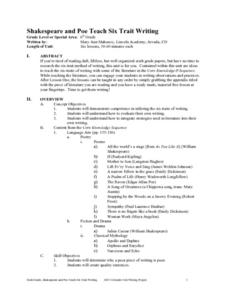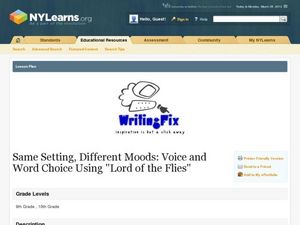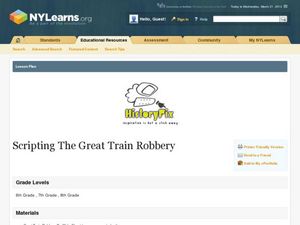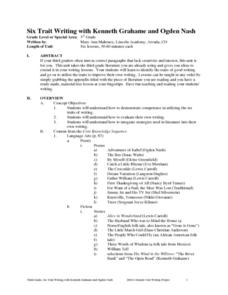Curated OER
Shakespeare and Poe Teach Six-Trait Writing
A Six-Trait Writing instructional activity helps your middle schoolers liven up their word choice and shows them how to evaluate their own writing. Class members take a close look at the language used in poems by Shakespeare, Kipling,...
Curated OER
Revision Checklist for the Accordion Essay
Encourage your class to revise their writing and check over their work by requiring them to complete an organization checklist. The checklist, created specifically for a accordion-style essay, asks writers to look over their formatting,...
Curated OER
Combining with Participial Phrases
Combine participial phrases and creative writing with this lesson, which is equally helpful for writing skills and conventions. After a mini-lesson on participial phrases and reading the picture book Dancing in the Wings, pupils use a...
Curated OER
So Much Depends Upon...Sixteen-Word Imagery Poems Inspired by Love that Dog by Sharon Creech
After reading Love That Dog by Sharon Creech (and possibly shedding a few tears), middle schoolers work on their own sixteen-word poems with a Six Trait writing activity. They focus on word choice in this activity to capture an...
Curated OER
Boogie Woogie with a B: Using Alliteration while Exploring Patriotic Tunes
Are you looking for a way to bring writing into your history instructional activity - or history into your writing instructional activity? This cross-curricular activity is helpful and fun, no matter what class you're teaching! Using...
Curated OER
Memoir Writing Based on Jerry Spinelli's Milkweed
Using chapter 1 of Jerry Spinelli's Milkweed, middle schoolers write a personal memoir based on Spinelli's style and a Six Trait writing activity. The lesson suggests several ways to activate prior knowledge, including a picture book and...
Curated OER
Same Setting, Different Moods: Voice and Word Choice Using Lord of the Flies
Whether it's dark, delightful, or somber, set the mood with William Golding's Lord of the Flies. High-schoolers practice descriptive writing by creating the appropriate mood for an original scene, starring one of the book's main characters.
Curated OER
The Ultimate Survivor Using Hatchet by Gary Paulsen
What items would you need to survive if you were stranded in a remote place? Using chapter 10 of Gary Paulsen's Hatchet, middle-schoolers work through a Six Trait writing activity to create a story about their own survival in a similar...
Curated OER
With Your Own Two Hands: Are You Changing the World or "Waiting for the World to Change"?
Can your pupils change the world? Explore this question with Ben Harper's song "With My Own Two Hands" and John Mayer's "Waiting for the World to Change." After listening to the songs, they discuss the tools at their disposal for...
Curated OER
Same Theme, Different Story Using Fox by Margaret Wild
Middle schoolers work with themes in this lesson plan, which is based on Fox by Margaret Wild. Because the book has multiple themes, it is a great way to transition into exploring literary analysis and writing stories. A Six Trait...
Curated OER
Scripting The Great Train Robbery
Take writing prompts to another level in this activity, which allows pupils to create scenes of dialogue based on the 1903 silent film, The Great Train Robbery. Useful for a language arts/history cross-curricular activity, the lesson...
Curated OER
The Presidential Quotation Report
Famous quotations by American Presidents are the focus of this Six Trait writing activity, which could be used in a U.S. History class or in language arts. After reading the picture book Theodore by Frank Keating, have your 7th graders...
Curated OER
Unlikely Diary keepers Using Diary of a Worm by Doreen Cronin
Put your class in the shoes of someone - or something - else with this lesson, which encourages writers to keep a diary from the perspective of a living creature or an abstraction. Use Doreen Cronin's Diary of a Worm and the Six Trait...
Curated OER
Impersonating Great Poets Using "Science Verse" by Jon Scieszka
A great way to bring poetry and parody into your language arts classroom, this lesson mimics famous poems based on Jon Scieszka's Science Verse. The activity not only allows the class to see examples of poem parodies, but to create their...
Curated OER
Bucket List Poetry
What is on your pupils' "Bucket Lists" - the list of things they want to do before they die? Their choices of activities for this list could be very revealing, and is a great source of inspiration for a personal poem. The lesson prompts...
Curated OER
Beautiful Noise Poetry
"What a beautiful noise comin' up from the street; got a beautiful sound, it's got a beautiful beat..." Use Neil Diamond's "Beautiful Noise" to guide your class through a Six Trait writing activity, in which they write an original poem...
Curated OER
A Poem for Two Voices for Dr. Jekyll and Mr. Hyde
Poems For Two Voices are a great resource in any language arts classroom, whether you are studying poetry or not. Focusing on The Strange Case of Dr. Jekyll and Mr. Hyde, this lesson plan prompts young authors to write a Poem For Two...
Curated OER
Painting Places with Words Using John Steinbeck's Of Mice and Men
Useful in an Of Mice and Men unit, or in a unit that focuses on descriptive writing, this lesson prompts young authors to impersonate John Steinbeck's writing style in the opening passages of the novel. A Six Trait writing activity...
Curated OER
"Lawd! Lawd! Lawd!"
From British accents to Texan drawls, a character's dialect can be an important part of the reading experience. A Six-Trait writing activity guides learners through the analysis of a character's dialect (Daniel Keyes's Flowers for...
Curated OER
The Six Traits of Writing
Targeted toward parents, the slides included here could be adapted for classroom use or shown at Back-to-School Night. The focus of the presentation is Six Trait Writing: ideas, organization, voice, word choice, sentence fluency, and...
Curated OER
Six Trait Writing with Kenneth Grahame and Ogden Nash
Third graders complete a unit of lessons on the process of six trait writing. They identify good writing traits, read and evaluate poems, literature, and myths, utilize a rubric to evaluate their own writing, and evaluate classmates...






















